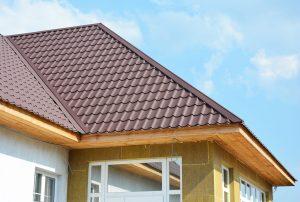
Ghana’s weather is all over the map, from the warm-humid areas like Kumasi to the hot-dry spots like Tamale and the coastal-hot savannah zones, including Accra. This mix of climates means that picking the right materials for building, especially roofing, can be tough.
In Ghana, aesthetics are the main reason people pick different types of roofing materials. In fact, research found that 44% of Ghanaians would choose a roofing material solely on its look. Certainly, the way a roof looks matters, but should it be the sole determining factor?
We’ve witnessed roofs deteriorate shortly after installation due to harsh weather conditions. Roofs are not just there to make our homes look good; they serve as the first line of defense against the elements. In a climate as diverse as Ghana’s, where the weather can swing from hot and dry to warm and humid, and even coastal-hot savannah, the practicality of roofing materials becomes crucial.
Let’s delve into the top three roofing materials that not only offer visual appeal but also provide a robust shield against the challenges posed by Ghana’s varying climates:
1. Metal Roofing

One of the most resilient roofing materials for Ghana’s climate is metal. Metal roofs are typically made of materials like aluminum, steel, or zinc. Why does this matter? These elements offer a perfect balance of durability and reflectivity.
The durability of metal makes it resistant to corrosion, a key consideration in regions with high humidity and occasional heavy rains. Moreover, metal roofs are known for their longevity, often lasting for several decades.
The reflectivity of metal is another significant advantage in Ghana’s climate. While this sounds like a mouthful, it simply means metal roofs can bounce back a lot of the sun’s heat. This way, the building doesn’t soak up too much heat, and you don’t have to use as much energy for cooling.
It’s worth noting that the initial cost of metal roofing might be higher compared to some other materials, but the long-term benefits in terms of durability and energy efficiency make it a worthwhile investment.
Also, metal roofs, as sturdy as they are, can get a bit noisy when it’s pouring rain. If the sound of raindrops hitting your roof bothers you, there’s an easy fix – add some insulation. This not only minimizes the noise but also enhances the comfort of your living space, creating a more tranquil environment, even when the heavens decide to open up.
2. Bitumen Roofing Sheets

If you’re a homeowner, you’ve probably seen this one already—they’re popular in Ghana. They’re also known as asphalt roofing.
Bitumen sheets are made by impregnating a fibrous base material, such as fibreglass or organic felt, with bitumen – a sticky, black, and highly viscous petroleum product. This process makes Bitumen a roofing material option you really should be looking at. Here’s why:
Bitumen roofing sheets are tough and can take on harsh weather. In spots with lots of rain and occasional storms, like some parts of Ghana, these sheets keep water out, making them a good choice where heavy rainfall is common. They’re also good at standing up to the strong sunlight in tropical places, making sure they last a long time.
When you’re thinking about roofing, cost matters. Bitumen roofing sheets are often more budget-friendly compared to some other choices. This makes them a good option for people who want a strong roof without spending too much. The fact that they last a long time adds extra value for your money.
Bitumen roofing sheets also do a good job of keeping your home comfortable. While they might not reflect sunlight as much as some metal roofs, they still help regulate the temperature inside. This is especially important in warm and humid climates where you want to keep your indoor spaces comfy.
3. Thatched Roofing

Thatch roofing is a roofing method that uses dried vegetation like straw, reeds, or palm fronds. Is that cause for concern? Not so much. Thatch has been used for centuries in various parts of the world, and it remains a relevant choice in Ghana too.
One of the standout features of thatch roofing is its timeless aesthetic. Thatched roofs bring a sense of tradition and cultural richness to a structure. The visual warmth and organic texture of thatch resonate with the architectural heritage of Ghana. The rounded huts that President Kwame Nkrumah built in Ghana, such as those at the Bagabaga Training College, stand as living examples of this traditional building approach.
But thatch doesn’t just look good; it’s also a natural insulator. The thick layer of thatch creates a barrier that helps regulate the indoor temperature. In the warm parts of Ghana, this natural insulation can keep the interior of a building cooler. If comfort is your thing, this is an option you can look at. You’ll get a comfortable living space without relying heavily on energy-consuming cooling systems too.
If you prioritize eco-friendliness, then thatch roofing aligns perfectly with your values. The materials used are renewable and often locally sourced, reducing the carbon footprint associated with manufacturing and transportation.
Choosing the Right Roofing Material for Ghana
In the end, picking the right roof material is all about what you want and need for your home. Of course, it’s a good idea to talk to roofing experts to figure out what works best for your budget, the weather in your part of Ghana, and how you want your house to look.
At Rosa Roof, we take great pride in guiding our clients through the process of choosing the perfect roof for their buildings. We understand that selecting the right roofing solution is a significant decision, and our mission is to make this journey as seamless and informed as possible. We go beyond this to get the job done for you—and without hassle.
Want to know if a flat roof is the right choice for you? Shoot us a message so we can talk about the best roof fit for your building.

